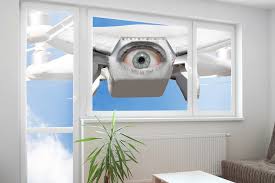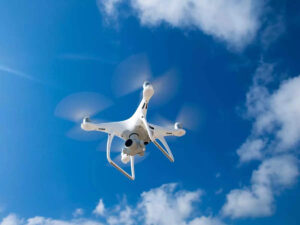Drones, also known as unmanned aerial vehicles (UAVs), have gained popularity over the years due to their ability to perform various tasks without putting human lives at risk. They are widely used in industries such as agriculture, photography, filmmaking, surveying, and military operations. However, the increasing use of drones has raised several ethical and privacy concerns that need to be addressed. In this article, we will discuss the ethical and privacy concerns surrounding drone usage.

Ethical Concerns:
- Invasion of Privacy: Drones equipped with cameras can capture images and videos of individuals without their consent. This raises concerns about privacy invasion and the potential misuse of data. People have a right to privacy, and their images and activities should not be monitored without their consent.
- Safety Concerns: Drones flying in populated areas pose a safety risk to people, especially if they malfunction or lose control. The potential for injury or damage to property is significant, and there is a need to ensure that drone operators adhere to strict safety regulations.
- Environmental Impact: The increasing use of drones has raised concerns about their environmental impact. Drones emit carbon dioxide and other pollutants, contributing to global warming and air pollution. There is a need to regulate drone usage to minimize its impact on the environment.
- Cybersecurity: Drones are vulnerable to hacking, which could lead to their misuse or theft of data. The use of drones for spying or espionage could have serious consequences, and there is a need to ensure that they are protected against cyber threats.
- Use of Drones in Warfare: The use of drones in military operations raises ethical concerns, especially when they are used to carry out targeted killings. There is a need to ensure that the use of drones in warfare complies with international law and ethical standards.
Privacy Concerns:
- Surveillance: Drones equipped with cameras can be used to monitor individuals and their activities without their knowledge or consent. This raises concerns about surveillance and the potential misuse of data. There is a need to regulate drone usage to ensure that they are not used for surveillance purposes without proper authorization.
- Data Collection: Drones can collect a vast amount of data, including personal information, without people’s knowledge or consent. This raises concerns about data privacy and the potential misuse of data. There is a need to ensure that data collected by drones are used only for legitimate purposes and are protected against misuse.
- Trespassing: Drones can fly over private property, raising concerns about trespassing and the invasion of privacy. There is a need to regulate drone usage to ensure that they do not infringe on people’s property rights or privacy.
- Stalking: Drones equipped with cameras can be used for stalking, especially when they are flown near people’s homes or workplaces. This raises concerns about personal safety and the potential misuse of data. There is a need to regulate drone usage to ensure that they are not used for stalking or harassment purposes.
- Public Safety: Drones flying in public spaces can pose a safety risk to people, especially if they are not operated safely. There is a need to regulate drone usage to ensure that they do not endanger public safety or infringe on people’s privacy.
Solutions to Ethical and Privacy Concerns:
- Regulation: Governments need to regulate drone usage to ensure that they are used ethically and do not infringe on people’s privacy. Regulations should cover issues such as privacy invasion, data collection, safety, and environmental impact.
- Education: Drone operators need to be educated about the ethical and privacy concerns surrounding drone usage. This will help them to understand their responsibilities and ensure that they operate drones safely and ethically.
- Technological Solutions: Technology can be used to address some of the ethical and privacy concerns surrounding drone usage. For example, privacy filters can be used to prevent drones from capturing images and videos of individuals without their consent. Drones can also be equipped with software that limits their flight range and prevents them from flying over restricted areas.
- Accountability: Drone operators should be held accountable for their actions, and there should be penalties for those who misuse drones or violate privacy laws. This will help to ensure that drone operators take their responsibilities seriously and operate drones ethically and responsibly.
- Public Dialogue: There needs to be a public dialogue about the ethical and privacy concerns surrounding drone usage. This will help to raise awareness about the potential risks and ensure that drone usage is regulated in a manner that protects people’s privacy and safety.
Conclusion:
The increasing use of drones has raised several ethical and privacy concerns that need to be addressed. While drones have many benefits, including their ability to perform tasks without putting human lives at risk, there is a need to ensure that they are used ethically and do not infringe on people’s privacy.

Governments, drone operators, and the public all have a role to play in addressing these concerns. By regulating drone usage, educating drone operators, using technology to address concerns, holding operators accountable for their actions, and engaging in public dialogue, we can ensure that drones are used in a manner that benefits society while protecting people’s privacy and safety.
Furthermore, it is essential to consider the perspectives of various stakeholders when addressing the ethical and privacy concerns surrounding drone usage. For example, the concerns of individuals whose privacy may be infringed upon by drones may differ from those of drone operators who need to use drones to carry out their work. Therefore, any solutions put in place must take into account the interests and concerns of all stakeholders involved.
Additionally, the use of drones in different industries and sectors may require different ethical and privacy considerations. For example, the use of drones in agriculture may require different regulations than the use of drones in journalism or filmmaking. Therefore, it is essential to have tailored regulations and guidelines for different sectors that use drones.
Finally, it is crucial to recognize that technology is continually evolving, and new uses for drones may emerge in the future. Therefore, it is essential to have a continuous dialogue on the ethical and privacy concerns surrounding drone usage to ensure that regulations and guidelines remain relevant and up-to-date.
In conclusion, while the increasing use of drones has many benefits, it is crucial to address the ethical and privacy concerns surrounding drone usage. By regulating drone usage, educating drone operators, using technology to address concerns, holding operators accountable for their actions, and engaging in public dialogue, we can ensure that drones are used in a manner that benefits society while protecting people’s privacy and safety.
It is important to recognize that the ethical and privacy considerations of drone usage may differ depending on the industry or sector and that regulations and guidelines must be tailored to these specific contexts. By doing so, we can continue to enjoy the benefits of drones while minimizing their potential negative impacts.









